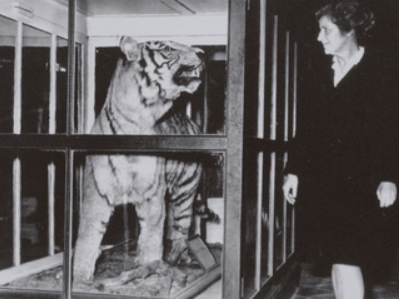
- Este evento ha pasado.
The Austro-Chilean scholar Grete Mostny. How a white young woman changed Chile’s National Historiography after her flight from the National Socialists in 1938/39
25/02/2022 @ 12:00 PM - 1:30 PM

Linda Erker
Universität Wien
25 de febrero del 2022, 12 horas (CET)
Formato híbrido
a) Online: https://us02web.zoom.us/j/6708521774?pwd=Ni9iNkNXNTl0QndtcmtrbXhNQXVNdz09
b) Presencial: Aula de seminarios (1er piso) IMF-CSIC c/ Egipcíaques, 15, 08001 Barcelona
Aforo limitado: preinscripción obligatoria (escribir a oliver.hochadel@csic.es antes del 24 de febrero).
Uso de mascarilla obligatorio, mantener distancia social.
Coordina Oliver Hochadel (IMF-CSIC)
Actividad organizada por el Grupo de Historia de la Ciencia,
Institució Milà i Fontanals (CSIC, Barcelona)
Abstract: Forced migration as a reaction to National Socialism represents individual as well as simultaneously collective, transnational, and global experiences. Not only identity-forming categories but also forms of knowledge are profoundly reshaped by processes of displacement and resettlement. The talk argues that the biography of the archaeologist Grete Mostny (1914–1991) offers an exemplary case study of such processes of adaptation on individual, collective, and academic levels. Due to her escape from Austria to Chile as a persecuted Jew in 1938/39, Mostny’s identity as a white European female scholar attained a whole new significance and became – based on her talent and ambitions – the door opener for her interdisciplinary career at the interface of archaeology and anthropology in her new homeland. When Mostny arrived in Chile, a new European and US hegemony had already begun to dominate academia in the country, which was trying to modernize itself and move from the academic periphery closer to the centre. Mostny, the once ‘racially’ discriminated scholar, fit well in this process by making use of her ‘European’ knowledge and her networks. My paper uses Mostny’s career as a lens through which to detect connected histories and entangled hegemonies in Chilean society, especially in academia. Moreover, it elaborates on the importance of certain sociological factors to be able to establish oneself (again) as a scholar in exile. Thereby I will show that the categories of race and ethnicity played a central role in the field of knowledge production and for career developments 12.000 kilometers far away from home.
CV: Linda Erker is a historian of the 20th century at the Department of Contemporary History at the University of Vienna. In her current project she is researching the migration of scholars from Austria to Latin America between 1930 und 1970 (especially to Argentina and Chile). Her doctoral thesis focused on a historical comparison between the Austrofascist regime (1933-1938) and early Franquism (1939-1945) from the perspective of the development of universities under fascist systems. She studied history and Spanish at the University of Vienna and the Free University of Berlin. Her research and teaching areas include: the history of persecution and migration; the history of science in Austria and Spain; comparative perspectives on fascism; ideological continuities of political caesurae in Austria; the culture of remembrance in Austria and Germany after 1945.
Material de descarga
